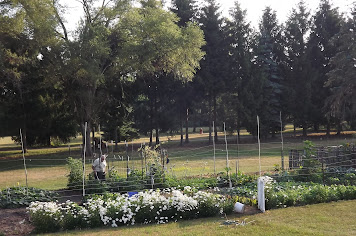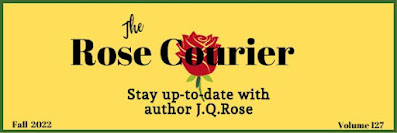Hello and Welcome to the Focused on Story Blog. I am JQ (Janet) Rose, your host.
 |
| Tomatoes Photo by JQ Rose |
tomatoes at the moment. GT, (Gardener Ted), made 1.5 gallons of tomato juice yesterday!
The question is:
What Do Gardening and Writing Have in Common?
What do gardening and writing have in common? You may smile
at that question because that sounds absurd. But, after much consideration, I realized
they are very similar.
 |
| GT in our garden |
Perhaps you’re wondering why I would even think about such a
comparison. It’s because my husband, Gardener Ted, is the gardener in our
family. I am the writer. These two topics are foremost in my mind in the
growing season.
Read on to find out what similarities I see in gardening and writing in preparation, planning, nurturing and harvesting. Can you think of more?
*Preparing a garden for planting—Before a gardener can
plant the garden, she has to turn the soil over to get rid of all the dead
plants, leaves, and detritus in the plot. Perhaps the garden needs added
nutrients to grow the plants, so a soil sample sent to the County can help
determine what is required to grow plants. A water source close to the plot is
ideal so one does not have to carry buckets of water every day.
A writer prepares to write by gathering the seeds of
inspiration that try to root in our fertile brains. Select one, then focus on that one. It seems
that ideas fill the writer’s brain while walking, in the shower, or in the
middle of the night when one does not have access to writing down those
brilliant ideas for characters, settings and situations.
 |
| Gardening and Writing |
*Planning a garden—Before doing any planting, the
gardener sits down and sketches the layout of the plot to determine how much
growing space she has. This will help her decide where to put the plants and
how many she needs for the season.
In my case, as a planner, not a pantser-style writer, I make
notes about the story I am going to write. Some writers outline their story,
make a storyboard or sketch scenes that they see clearly. Then there are the
pantser writers who write by the seat of their pants with no planning. I have
tried that, and I made more work for myself because I had to remove a LOT of words
that did not move the story forward.
*Planting the garden-- One does not haphazardly decide
to throw seeds in the garden or plant seedlings anyplace without considering
the shade and sunny areas. Read the back of the seed package to discover when
to plant the seed and how many days it will be for harvesting. Be practical and
realize the size of the area you have for a garden. Don’t buy a ton of plants
with no room to plant them!
Planting for a writer is putting words on the page.
Beginning a story can be difficult for those who are perfectionists. Don’t be
paralyzed by trying to get the perfect beginning to the story. From experience,
I realize the beginning usually has to change once the ending is written. The
first draft is written knowing there will be changes to make a tighter,
stronger story in the second draft, and the next and the next... Ernest
Hemingway said, “The only writing is re-writing.”
*Nurturing the garden—I love gardeners. They are optimists. Every spring when they plan and plant the garden, they always look forward to a great harvest. Even if last year’s crops were pitiful, they plant with happy hearts seeing only a productive, tasty outcome. But they do not plant the garden and then leave it to grow on its own. It takes work to get results--caring for the plants by weeding, fertilizing, and fighting pesky insects’ invasions as well as, protecting the plants from hungry rabbits and deer. Because Mother Nature likes to play tricks on gardeners, they are always watchful of temperature changes and rainfall.
A writer doesn’t write the story and then leave it alone either. There must be many readings to edit for the flow of the story, character development, grammar, punctuation, making sure your character has blue eyes and drives a red car throughout the story and a satisfying ending that wraps up loose ends.
*Harvesting the garden—The reward for the hard work is
a crop of delicious vegetables brought from the garden, washed, prepared and
eaten at the gardener’s table. Another unexpected reward is the smiles on
neighbors and friends when the gardener shares her vegetables with them.
Much like sharing the harvest, the reward for a writer is
finishing the story, poem, novel or essay and sharing it with others. I know
many write for the joy of telling a story but keep it locked in their computer,
a drawer or hidden under the bed. I encourage you to read or tell your stories
whether reading them to a friend or group or publishing them for the whole
world to enjoy.
Another reward I didn’t know about until I was a published
author is meeting other authors/writers along the way. I have met so many
generous, kind writers through the Internet. Many I call friends even if we
have never met in person. The whole world opens up to you when you join the
amazing folks who are writing their stories.
 |
 |
Click here to receive the Rose Courier delivered quarterly to your inbox. Filled with photos, updates, freebies, new book releases and more! Thank you. |






3 comments:
Fun comparison! I loved your post, Janet!
Gardeners are optimists. So are writers. :)
Great analogy!
That is a lot of tomato juice...
@Susan--glad you liked the post. I can add that gardeners AND writers are optimists. Thank you!
@Alex--Thanks, Alex. I fear we are going to have another gallon or two of tomato juice this week!!
Post a Comment